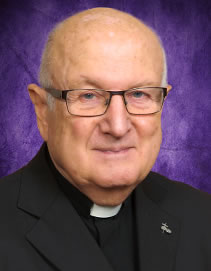
From the Director
As I write this, I just got off the phone with Father Bill Morton. You remember Father Bill. He is the Columban priest whose parish in Juarez, Mexico, abuts the U.S. border just west of El Paso.
This morning the problems at the border were featured on the national news, so I thought I would call Fr. Bill and find out what was happening from his vantage point. When I called he happened to be in conversation with a woman who is about to apply for an emergency visa so she can attend her brother’s funeral in Oklahoma. Family ties are strong, and they need to be attended to in times of grief. But so often the government rules and regulations prevent a nimble response. I hope she can travel.
When I think of the situation at the border, what comes to mind is the old French proverb, “The more things change, the more they remain the same.” So much has changed since the book of Leviticus was written. The place and the people are different, but the problem remains the same. “When an alien resides with you in your land, do not molest him. You shall treat the alien who resides with you no differently than the natives born among you; have the same love for him as for yourself, for you too were once aliens in the land of Egypt. I am the Lord.” (Leviticus 19:34)
As a Columban, I have been visiting the southern border off and on for more than 20 years. It is a dramatic place where the superpower of the United States encounters mothers, fathers, and children the struggling nations of El Salvador, Guatemala and Honduras. There is friction, incomprehension and even desperation at the legal crossing places and even more of it at illegal places.
I suppose many of the people who arrived at Ellis Island in New York a century or more ago needed help making their way to the ferries that would take them to the trains that would take them west.
Perhaps one type of place where the friction can be loosened is a shelter. Places like Annunciation House or Casa Nazareth are working once again with big numbers of people in need of meals, clothing, showers, medication, a night or two of shelter and help traveling to relatives elsewhere across the United States. Along with those things, a listening ear, a few gracious words in Spanish, a little kindness, a smile are all part of what the shelters try to deliver. Sometimes a pair of shoelaces can be a precious gift. Of course, with 200 to 300 new people arriving at just one shelter on just one day, even simple kindness can become a daunting challenge.
I suppose many of the people who arrived at Ellis Island in New York a century or more ago needed help making their way to the ferries that would take them to the trains that would take them west. Now, someone has to help even the lucky ones make phone calls to relatives, get to the bus station, purchase the tickets to the right place.
For a long time, El Paso del Norte has been a place of passage. Volunteers from around the country are joining hands with local people to ease the passage to the north.
In many of our parish liturgies we sing the words, “The Lord hears the cry of the poor.” We do want Him to hear us when we call to Him. I think I will meditate on, Proverbs 21: 13. “He who shuts his ear to the cry of the poor will himself also call and not be heard.”